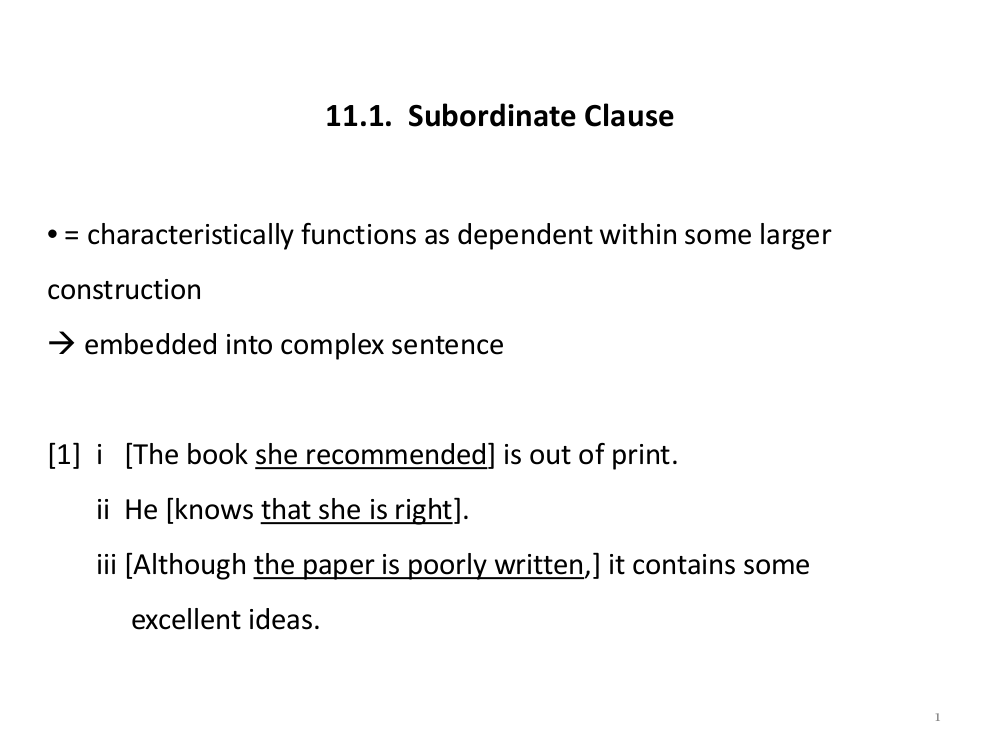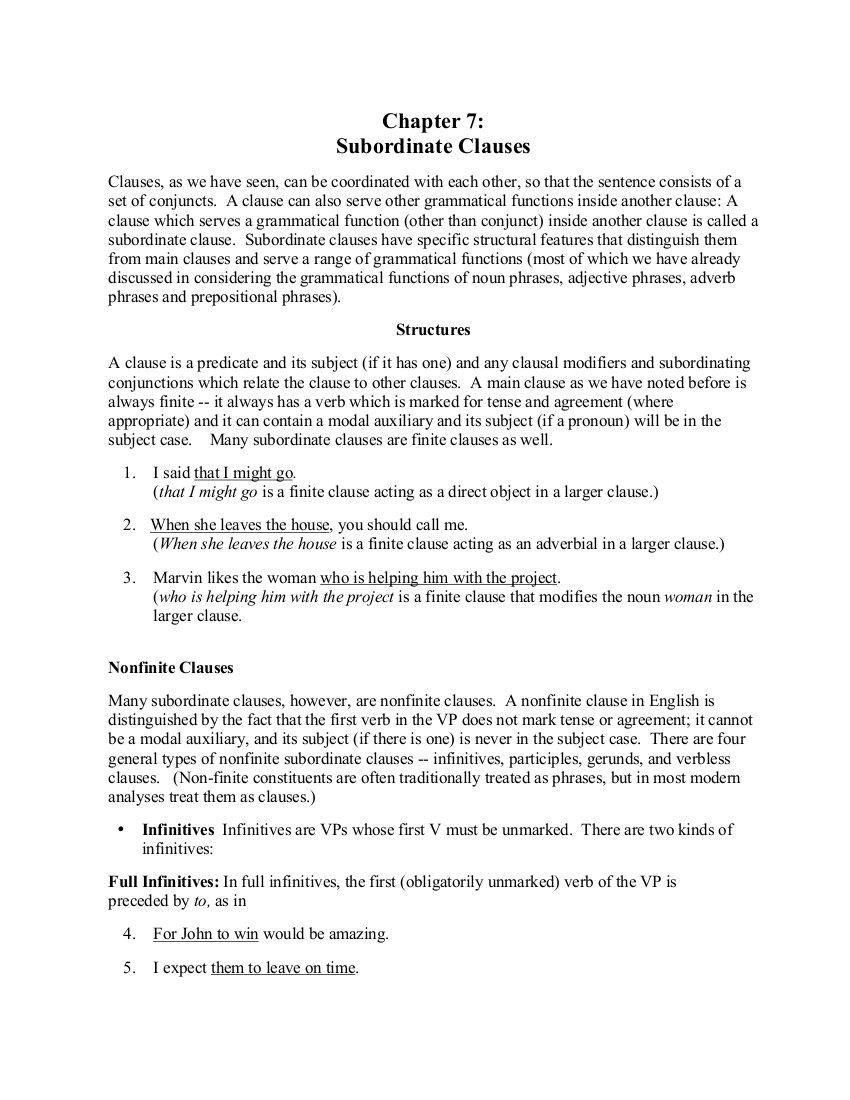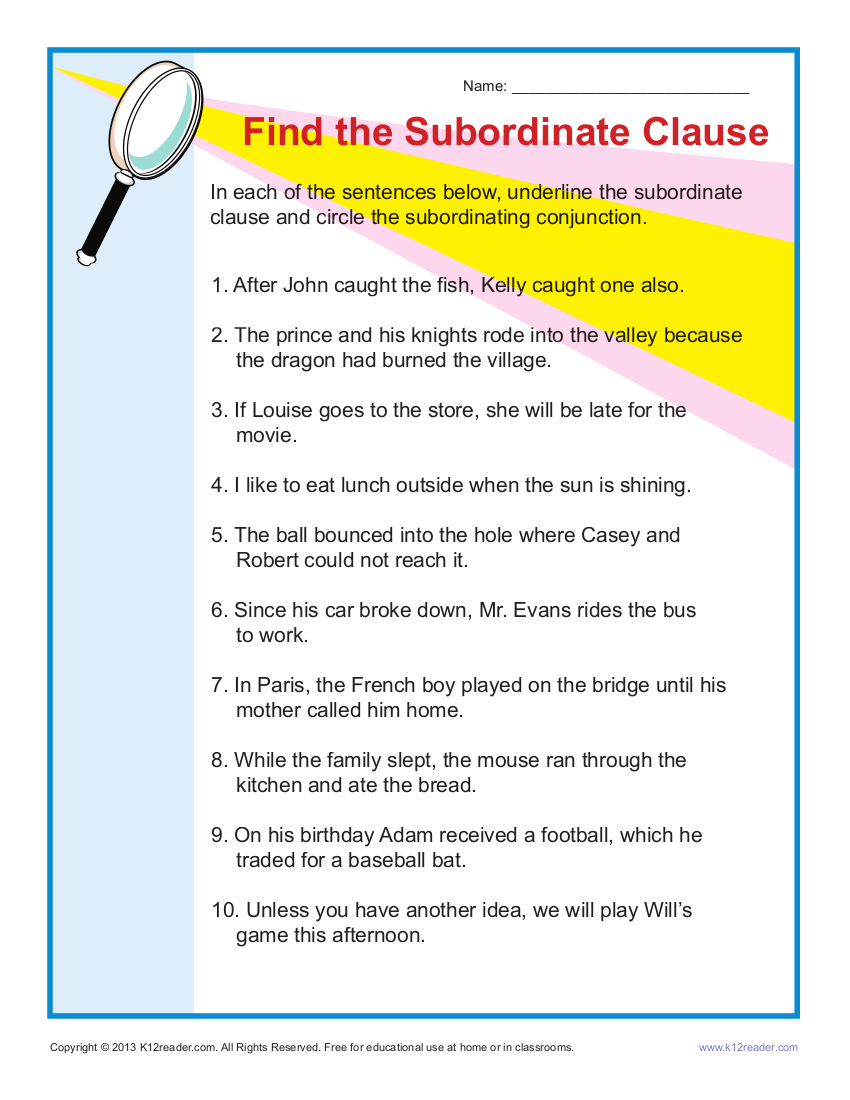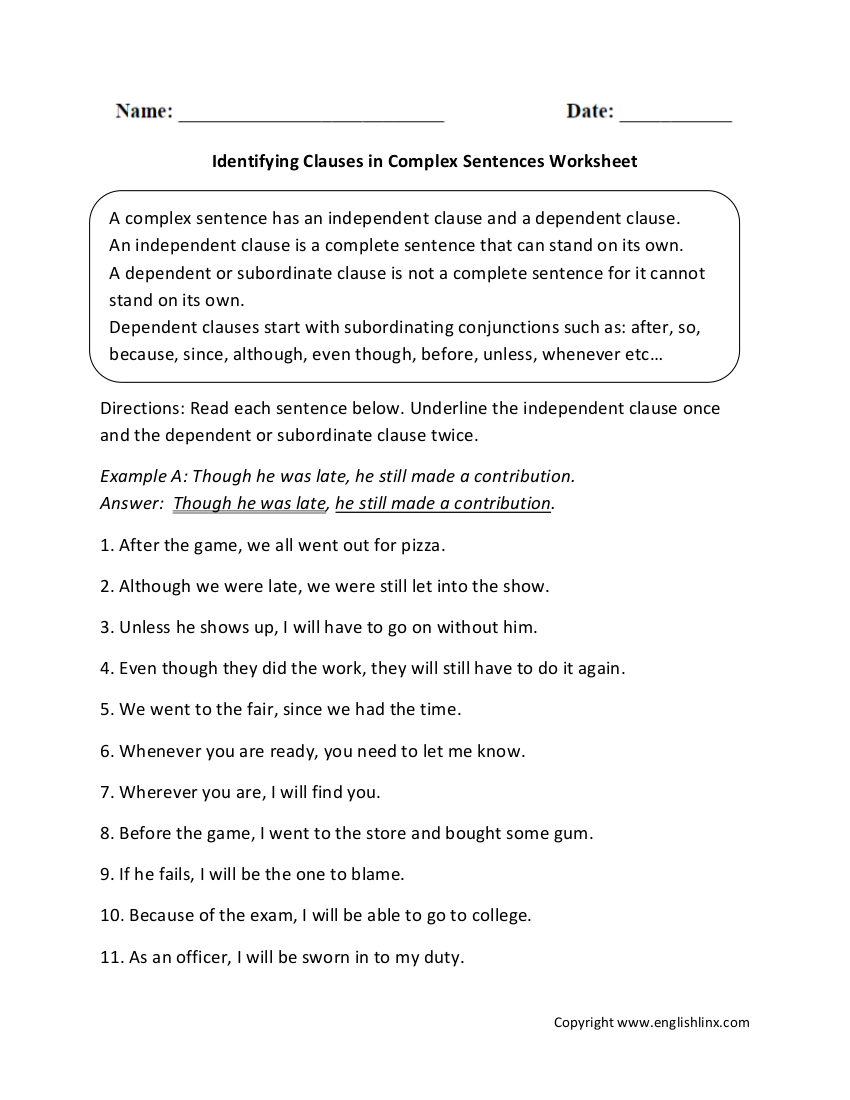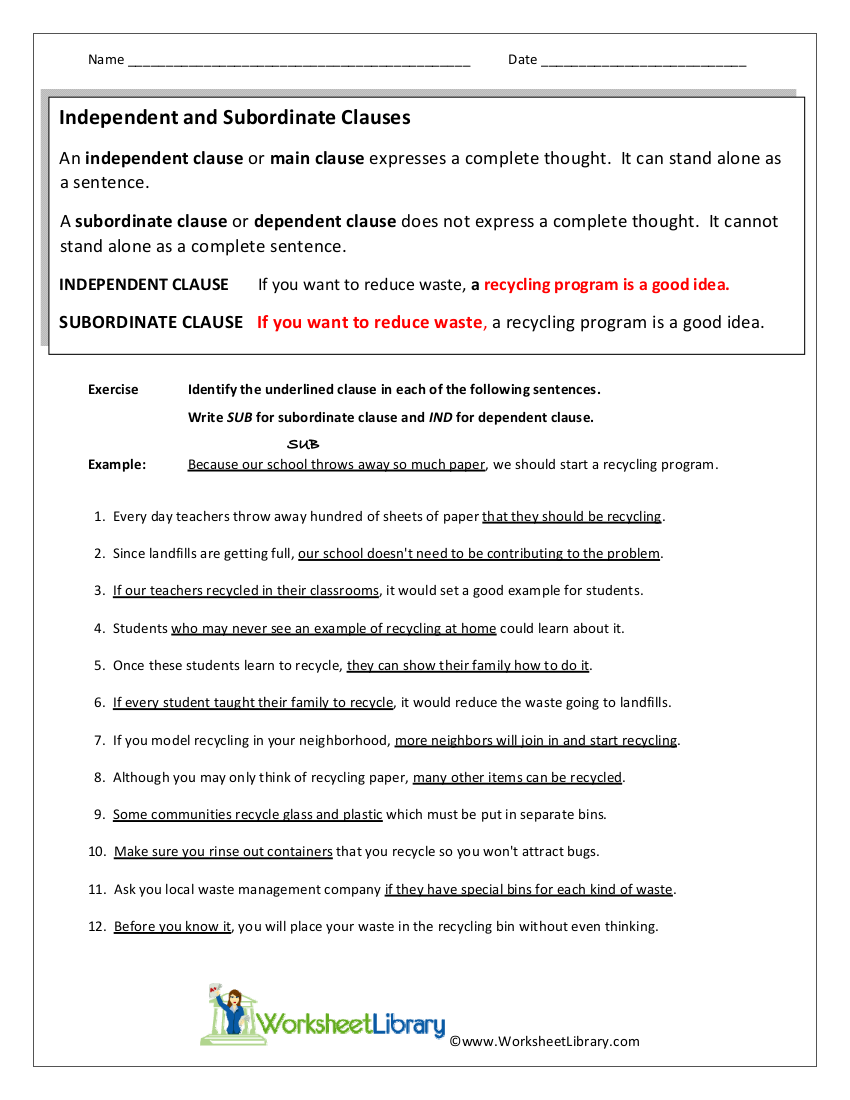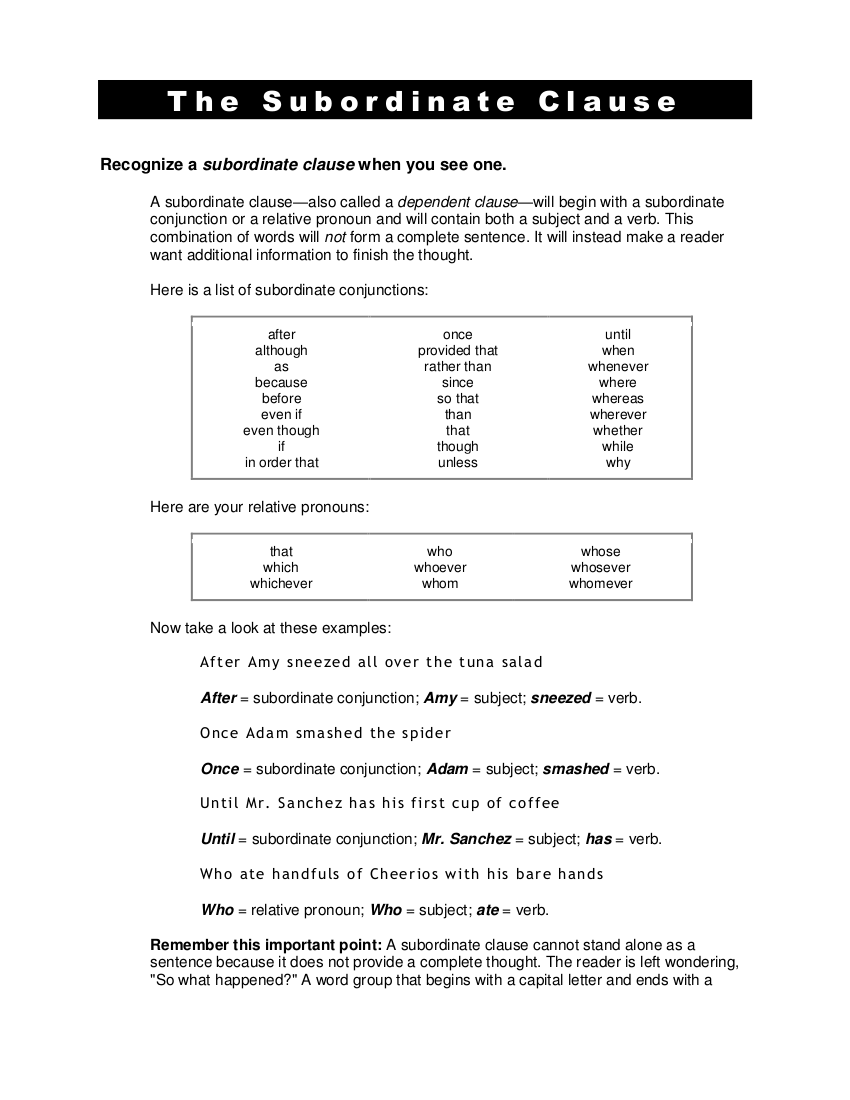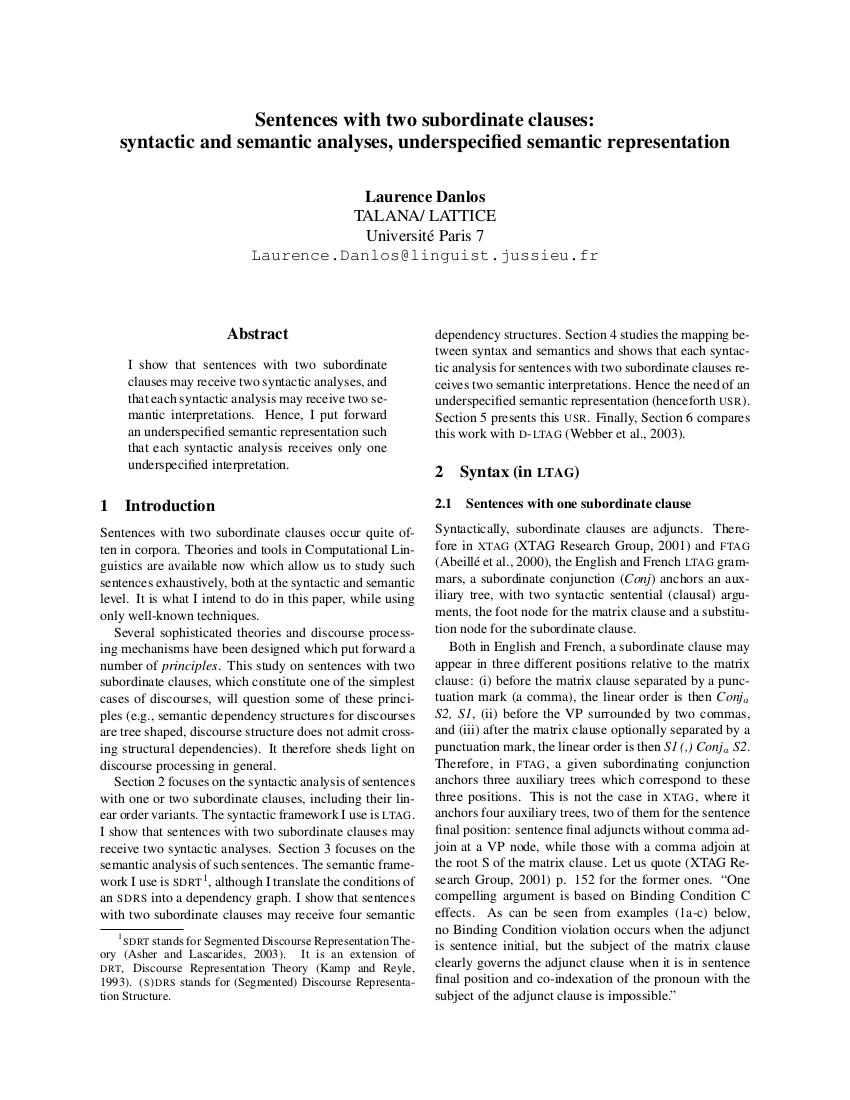Subordinate Clause
Have you ever met a person who is way too needy he or she can’t even go to someplace without having someone in tow? We often associate them with the word clingy and eventually the word dependent. Such a person could not seem to live and function without having someone else on their side, as if they are babies who are, understandably, dependent on their parents. Subordinate clauses, or dependent clauses, are like that. From just looking at their alternate name, you would already know that these type of clauses just could not live without the main clause with them.
Learn more about subordinate clauses and how to use this with the help of these eight subordinate clause examples.
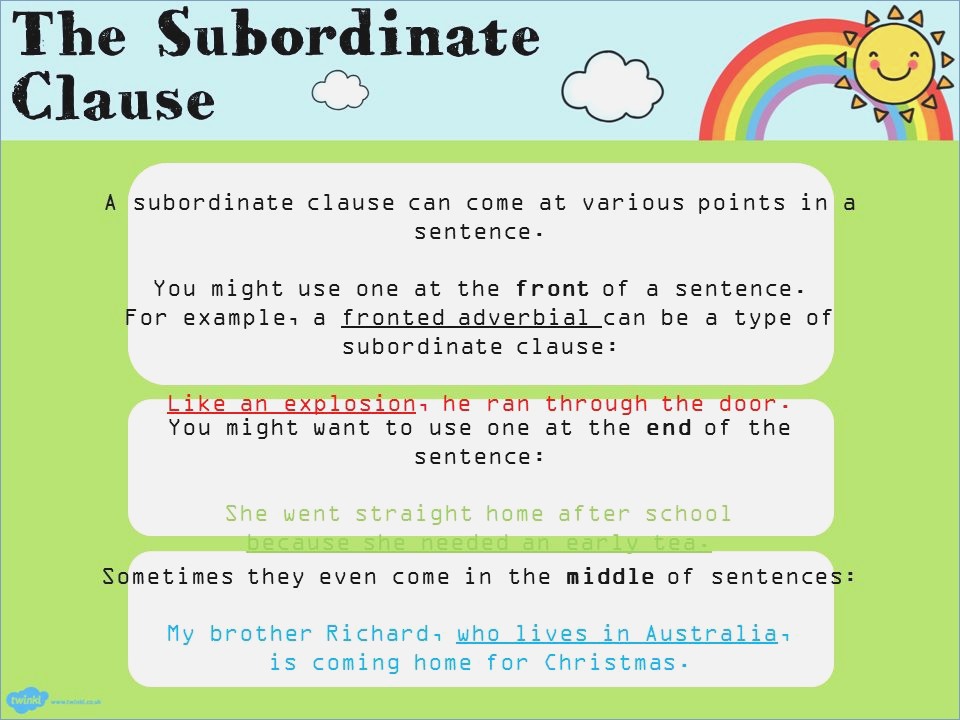
Understanding Clauses
Before getting straight to discussing subordinate clauses, let us get to know first about clauses in general.
A clause is basically a group of words that contains at least a subject and a verb, or at least a single verb group, which makes it different from a phrase since phrase does not contain a subject and a verb at all.
Every single complete sentence you have read in your entire life contains at least a single clause.
Importance of Clauses
We need clauses in our daily conversations and write-ups. We use clauses in order to completely express our thoughts and even feelings. We need clauses because it helps us communicate effectively.
When you master how to write a clause, you will be able to quickly and easily improve the quality of the way you communicate, be it in written form or in spoken form. Having a clause in your statements will enable you to direct the attention of your reader or listener toward the direction of the message you want to convey to him or her. The lack or the wrong usage of clauses can badly affect the meaning of your sentences, resulting in misunderstandings when communicating.
Definition of Subordinate Clause
A subordinate clause, which is also called a dependent clause, is a type of clause that could not stand on its own in a sentence because it does not express a complete thought. A subordinate must always be accompanied by a main or independent clause in order to function properly and express a complete thought. Subordinate clauses should always begin with relative pronouns or subordinating conjunctions, that makes the entire clause a subordinate. Even if this type of clause contains a subject and a verb, you can still not consider it as a complete sentence because of the subordinating conjunction that is placed in the beginning.
Examples of Subordinate Clauses
Even if subordinate clauses are dependent on the main clause, it is still important because it makes an entire sentence more detailed. Here are some examples of sentences with subordinating clauses (take note of the italicized words):
- After the dog ran, his owner waited for him with anticipation.
- His sister got mad at him because he ate popcorn.
All About Subordinate Clauses
Examples of Subordinate Clauses
Finding Subordinate Clauses Worksheet
Independent and Subordinate Clauses Worksheet
Parts of Subordinate Clauses
The parts of a subordinate clause include subordinate conjunctions and relative pronouns.
A. Subordinate conjunctions
Subordinate conjunctions are in charge of the smooth transition between two parts of a sentence with words expressing things like place and time.
Here is a list of some of the most common subordinate conjunctions:
- After
- As
- As long as
- Although
- Because
- Before
- Even if
- Even though
- If
- Now
- Now that
- Once
- Since
- Than
- Though
- Unless
- Until
- When
- Whenever
- Whereas
- Wherever
- Whether
- While
- Whoever
B. Relative pronouns
Relative pronouns are those words that are used to introduce a dependent clause. These words are considered as “relative” because these are related to the subject of the sentence.
The relative pronouns are:
- which
- whichever
- whatever
- that
- who
- whoever
- whose
Types of Subordinate Clauses
Subordinate clauses can work or be used as the noun, the adjective, or the adverb in a sentence and this is where the types of subordinate clauses are derived from, namely noun clauses, adjective clauses, and adverb clauses.
Always keep in mind that none of these can express a complete thought on their own.
A. Noun Clause
A noun clause is a group of words that acts as a noun in a sentence.
To easily identify that it is a noun clause, make sure that you take a look at the relative pronouns that are found at the beginning of this type of class. Such relative pronouns include how, which, who, or what. And these relative pronouns are also combined with a subject and predicate.
- The cat can sleep wherever it wants.
Here, “wherever it wants” acts as a noun for where the cat would want to sleep. It is considered as a noun clause because it has a subject (it) and a predicate (wants). Here’s another sample sentence you could look at:
- Whoever fed the baby milk is just concerned.
“Whoever fed the baby milk” is the noun in the sentence, which means that it is the person who fed the baby milk.
Another thing to make sure that a noun clause is being used in the sentence, switch it with a single noun and you will notice that it could already make sense or that it expresses a complete thought.
- The cat can sleep on the couch.
- The sister is just concerned.
B. Adjective Clause
We all know that adjectives are used in describing, which means that adjective clauses are a group of words that are used to describe, just like how adjectives are used to describe a subject in a sentence.
Adjective clauses also use pronouns who, that, which; adverbs what, where, why; and a verb. Adverb clauses would also make use of a pronoun or an adverb that will serve as a subject and a verb in a clause.
This clause would answer the questions “what kind?” or “which one?”
This clause would answer two formulas:
- pronoun or adverb + subject + verb
- pronoun or adverb as a subject + verb
Here are some examples you could peruse:
- Whichever flavor of french fries you want
Whichever (pronoun) + flavor (subject) + have (want) is an adjective clause that describes the choice. As you may have noticed, it is not entirely a full sentence.
- My sister is the one who ate the french fries.
“Who” (pronoun acting as subject) + “ate” (verb) is an adjective clause that describes “my sister”
C. Adverb clause
An adverb clause is a group of words used in a sentence that acts as the adverb in the sentence.
Adverb clauses would answer the questions where, when, how, and why and would always begin with a subordinate conjunction. Take note of this example:
- The contestant ran until he got to the finish line.
This sentence answers the question “how long did the contestant run?” along with the adverb clause “until he got to the finish line.”
- After the contestant arrived he drank water.
With the adverb clause “after the contestant arrived,” this sentence answers, “when did the contestant drink water?”
Learning about Subordinate Clauses
Sentences with Subordinate Clauses
Subordinate Clauses as Modifiers Example
How to Write a Subordinate Clause and Avoid Mistakes
As you master writing a subordinate clause and learning more about it with its type, it would be best for you to review its vital parts which are
- a subject,
- a verb, and
- a subordinate conjunction or relative adverb.
You can find a subordinate clause at the beginning of a sentence and you can also find it at the end of a sentence. Wherever you can find it in a sentence, just make sure that it is paired with an independent clause, because without a main or independent clause, a subordinate or a dependent clause could simply not exist on its own. As mentioned, subordinate clauses’ purpose is to add additional details to a sentence and that’s just that.
To start, you have to write and start with a clear main or independent clause:
- The baby ate.
Right after having a clear main or independent clause, you should now add a dependent clause and you have to keep in mind that you should also have an additional subject and verb in order to make the clause a subordinate clause.
- The baby ate whatever she wanted to.
The entire sentence had used the noun clause “whatever she wanted to.” The subordinate clause began with a subordinate conjunction “whatever” which is then followed by the subject “she” and the verb “wanted.” The subordinate clause obviously needed the first part “The baby ate” in order to create a complete thought.
In order for you to successfully avoid mistakes when it comes to writing subordinate clauses, always keep in mind that a clause is always never a full sentence on its own. Which means that the usual mistake you commit is that you would write in fragmented sentences.
- Whoever fed the baby milk. (This is a fragment sentence).
Even though the aforementioned has a subject“whoever” as well as a verb “fed,” this still does not make a sentence and it still did not express a whole thought, leaving the question to the readers: “what happened to whoever fed the baby milk?” This is when you would find the need to add an additional clause, which is, of course, a main or an independent clause.
- Whoever fed the baby milk popcorn is just concerned. (This is a complete sentence).
In order to communicate effectively, one must observe proper grammar and one of the most basic things you could do is to make sure that you could distinguish the subordinate clause used in a sentence. To know more about the independent clause that subordinate clauses cling to, you may also be interested in Independent Clause Examples (with Worksheet Samples in PDF).


